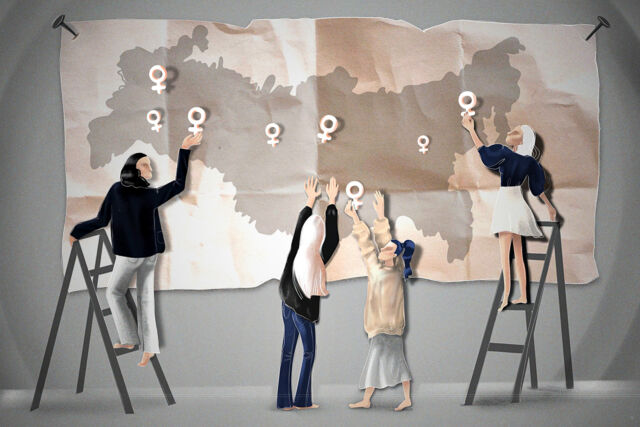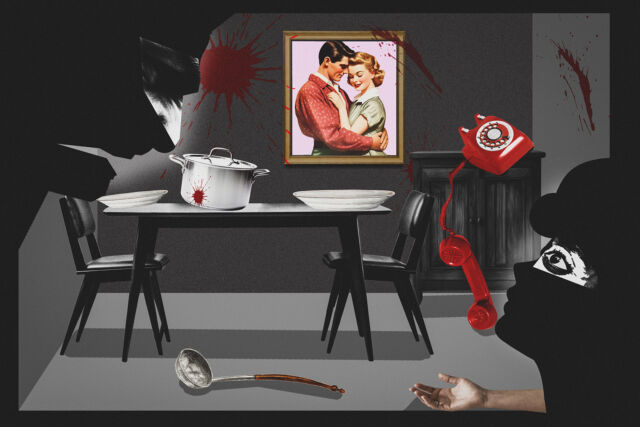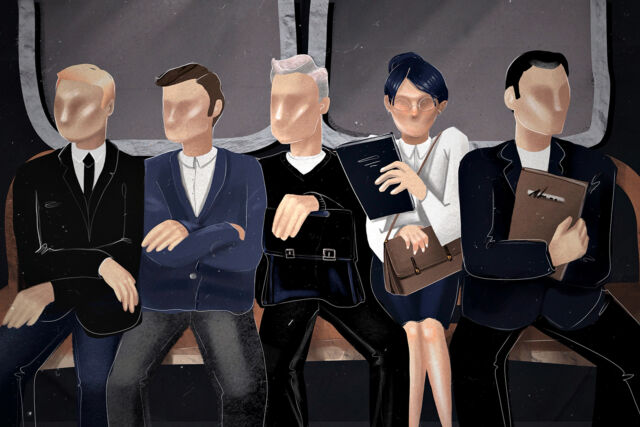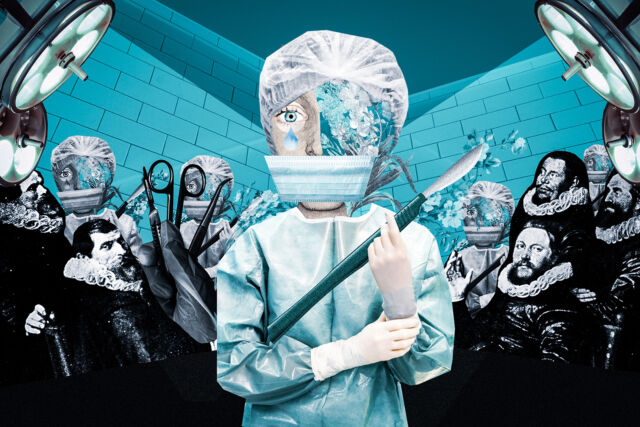Daria Besedina, an architect and member of the “Urban Projects” organization, has become one of the independent deputies who managed to enter the Moscow City Duma in 2019. Since then, Daria has repeatedly attracted media attention. At the beginning of her deputy career, she recorded a video message sitting at a table with a rainbow flag. In March 2020, she came to a Moscow City Duma session wearing a T-shirt saying “Zero Out”, opposing the amendments to the Constitution and the “reset to zero” of Vladimir Putin’s term.
Glasnaya talked to Daria about how she stopped being politically indifferent and why it is important not to be afraid when standing up for the Russia of the future.
“I entered the Moscow City Duma not to object but to suggest solutions”
In the winter of 2013, I started volunteering at Gorodskiye Proekty. It happened quite randomly. I came across Maxim Katz’s blog and realized we shared the same opinions, values, and ways of thinking. I became interested and started following his work. When they were looking for volunteers, I decided to join. It’s not like I had a great goal of changing the world. I saw volunteering as a little adventure with nice people and activities that helped me escape the routine. But eventually I got carried away as I found myself among interesting and inspiring people with whom you could actually change the world.
We always propose our projects to the mayor’s office. And we always get the same answer: no, we are not going to do it. This response is understandable. The mayor’s office cannot politically afford to interact with social activists, especially the opposition. But our concepts often end up implemented. For example, if you look at our proposals for the reconstruction of Tverskaya Street in 2013 and 2014, you will see that now it looks exactly like those visualizations we suggested.
We all live in an urban environment. This is our yards, sidewalks, roads, streets, traffic lights, underpasses—every step we take in the city. Will we feel comfortable and safe in this environment? Will it be beautiful and comfortable? Would elderly or disabled people or little children be able to walk the streets? The negative answers to these questions are the consequences of the policies the city authorities practice. The urban environment is directly linked to the general political situation in the country. At the city level, we can identify the same problems—most notably, lack of rotation at positions of power. People that make decisions—the mayor and his close associates—are out of touch: they do not walk the streets and do not know what our sidewalks look like. The authorities do not receive feedback from the people.
If the mayor cannot lose, he won’t be very interested in citizens’ opinions.
It is a long-standing problem in Moscow that citizens’ involvement in decision-making is falsified. The real feedback is replaced by Active Citizen, electronic voting, etc. The mayor’s office has a different goal: to report they are doing great, are transparent, and use modern technology. Our city suffers from the decisions of the authorities that do not have much to do with reality.
I entered the Moscow City Duma not to object but to suggest solutions. I wanted to show we could have adequate European-style politics in Russia. I am basically a visualization, just like our ideas on the urban environment. I am showing the way it could be.
“I liked the election enormously”
In 2013, there was a Moscow mayoral election. I worked at Navanly’s campaign office. It was my first political experience. I liked the election enormously and got carried away again. A year after the mayoral election, we tried to help Maxim Katz get elected to the Moscow City Duma. We really tried but didn’t have any luck. Then, in 2015, in order to nominate candidates to the State Duma, we had to win some regional list elections (at the time, we cooperated with the Civic Initiative party headed by Andrey Nechaev). We could choose any region.
We opted for Kaluga. It is not far from Moscow, people there live close to each other so campaigning there was not that hard. I was one of the nominated party candidates too. I liked the town, it still holds a special place in my heart. However, we eventually got removed from the race. It was quite typical—they said “the signatures are not good enough, piss off.” They decided we’d broken the “code.» But our team always follows the law. So we did not care about their unwritten rules and what kinds of arrangements there were.

At the beginning of 2017, I joined the Yabloko party. In 2018, Yabloko tried to propose a Moscow mayoral candidate but it didn’t work out. One of the episodes of that campaign was the primaries and I decided to participate just for the fun of it. I made jokes about how it worked perfectly because I was turning 30 that summer. At the debate, it was important to me to ask other candidates questions and see how competent they were in the urban environment topic. We were proposing a mayoral candidate so we had to make sure that person understood governance, transport, knew why people needed cycling infrastructure and how it all worked.
I liked it and started getting good at it. People were voting for me and I was winning. I was fifth in the primaries. In the Moscow City Duma elections, there were two Gorodskiye Proekty candidates—Nastya Bryukhanova, who is now standing as a candidate to the State Duma, and me. Nastya was removed because of disqualified signatures, but I was not. Our campaign staff did something that was considered impossible—we won at the single-mandate district level. We were expecting to win but it was still incredible. “What?! What happened? Have we actually been elected?!”
“Moscow, as a city, still has a long way to go”
I am extremely disorganized. It is hard for me to work on long-term projects. That is probably why I had problems with studying. Nevertheless, I finished the Moscow Institute of Architecture. Before that, I went to an art school. My mom’s first education was in arts. So, visual culture has always been a part of my life. It was not a coincidence or some kind of sudden revelation that I got interested in urbanism. It was something that had always been with me. My favourite kind of stone is brick because you can create beautiful buildings with it.
I spent my ninth and tenth years of school in Hamburg but then my father’s contract (he is a physicist) expired so we moved back to Moscow. From the beginning, I noticed you felt different in these two cities. Hamburg is a nice and comfortable city. One of my favourite places there is the elevated metro. It is a beautiful Art Nouveau structure, an example of old architectural engineering with metal pillars. There is a lot of water and an active social life in Hamburg. The city has spaces where you can have a peaceful and active life.
Also, there are a lot of immigrants living in Hamburg. Not only those who we are used to calling migrants but people of various backgrounds, mostly from European countries. If you look at my class picture, you will see only half of my classmates were German. It doesn’t matter what your background is when you are in such a group. The atmosphere at school suggested people were different and that it was normal. People can have different skin colors, different native languages, look different, have a disability, be gay, and many other things. It was that experience of studying at a German school that influenced me so much.
I didn’t like Moscow for a long time but I couldn’t understand why. Then I got it—the bloody cars are everywhere! The city is littered and uncomfortable.
It is noisy, dusty, and dirty. There are nice people, nice places, beautiful streets, but something doesn’t feel right still. All that is a question of the urban environment and where the priorities are in the city. It is not only buildings and what happens inside of them that are important but also what happens outside: our streets, squares, etc. Moscow, as a city, still has a long way to go. Although when you compare it to other Russian cities it doesn’t seem so bad.
“We are not seeking to criticize the authorities”
When I was a student, it was common for people to be politically indifferent. If someone was interested in politics, they were considered weird. That is how it was in my friends’ circle and our generation. Today, twenty-year-olds are way more into politics and active. I had my own life, friends, hobbies, trips. I can’t say the change in my mindset was instant and drastic. It was a smooth transition.
And now I am the Moscow City Duma deputy. I try to engage in politics in the rapidly shrinking Russian political space and at the same time promote the idea of comfortable cities because this is a priority for me.
Our main value is having a positive program. We are not seeking to “criticize the authorities.” We offer an alternative and propose fighting not against someone but rather for ourselves, our ideas, views, and ideals that inspire us. It helps me personally to keep going, not give up and engage other people with similar opinions. Of course, all kinds of things happen. You come [to Moscow Duma majority] and say, “Look, this is white.” And they reply, “What do you mean ‘white’? This is black.”

When Nastya Bryukhanova was removed from the elections after signature disqualification, I was furious. When we were disqualified in Kaluga, I was really angry too. We sweated blood to collect those signatures but they were not accepted. During the 2018 presidential elections, I was distributing newspapers campaigning for Yavlinsky as a part of the Moscow Yabloko campaign office. It looked very powerful from the inside. We delivered tons of newspapers across Moscow and other cities. Misha, my future husband, traveled to Samara and supervised the distribution of newspapers there. We are used to taking second or third place but this has always been a significant result. And when on the night of the elections we received one and a half percent of the votes, we couldn’t believe it, we didn’t know why it happened. It really hurt. All our efforts were for nothing.
However, for me the sense of injustice is not permanent, it does not influence my actions. I am fighting for my worldview together with those who share my values. This is the essence of political struggle and political association that brings people who share one idea together. They share it, promote it, and go to the polls. This is how a healthy political system works.
I don’t seek to be liked by people but I have noticed that when you do something you think is right, this is what happens. People haven’t had an opportunity to admire someone for a long time, they want to trust someone. There are so many grim things happening so you want to shift your attention to something positive. I am also tired of writing about bad things. I have a blog
We get some news and I think, “Damn, I have to write that people are fools and it is hopeless, again.” And the comments would say, “Yes! People are fools and it is hopeless!” But I don’t want to do it, I’m sick of it!
I don’t want to promote hatred. On the contrary, we have to celebrate good things in dark times like these.
“I want us to build a state that has people as the main value”
The main change that must take place in Russia is the emergence of real democracy instead of its imitation. We should also stop the falsification of elections at all levels: when they fabricate criminal charges against independent politicians, when special laws are created before elections to prevent certain people from entering them. All this should be a thing of the past. It is up to the citizens to decide how the city should function; it is up to us all to decide, through elections and referendums, what should happen in the country.
I want us to build a state that has people, human dignity, quality of life, freedom to create, study, work, freedom to be yourself, as the main values. I believe that we as a nation, as a country, can do this, we know how to. There is no reason why we cannot build a country like this.
We are now in a difficult political situation. But Putin and Putinism will not last forever. Putin is a mere mortal. The system he built is ineffective, it will collapse by itself. And when it happens, there must be an alternative.
We, the citizens of the country, must stand up and start rebuilding our state. We need good deputies and public figures and experts in all kinds of fields in order to do this.
I had two goals when I was nominated for the Moscow City Duma. The first one was to shake things up, to see what kind of place it was, what it could be useful for. And I managed to shake things up. In terms of lawmaking, of course, there was not much practical use. United Russia is blocking any proposals, formally we do not pass anything new. But the Moscow City Duma has stopped being a boring place no one cares about—it is being watched, it creates a city agenda. The second goal was to show how you can be a deputy and at the same time promote urban initiatives to create a healthy and comfortable city for happy people.
I have made amendments to the Moscow budget both years I’ve been in office. This is one of the most important parts of deputies’ work (unfortunately, my amendments were not supported by the majority). The budget is an opportunity for demonstrating a different approach. I proposed reallocating the transportation budget. A huge part of it, about a half, is spent on construction. A significant share of money is invested in automobile infrastructure, although, on a regular basis, cars are used by 20 to 40 percent of the citizens, that is a minority.

I suggested spending most of the budget not on road construction but on the development of public transportation and the purchase of vehicles. One of the reasons for the shortage of public transport is the abandonment of trolleybuses. They were partly replaced by diesel buses and partly weren’t replaced by anything. In those areas that are highly dependent on trolleybus traffic, people could feel the negative impact. I suggested purchasing more vehicles, with an emphasis on trolleybuses, and building more tram tracks. Our trams do not enter the city center, this is a strange and unhealthy thing that we inherited from Soviet times. And we must fix this.
We need to design intersections taking into account the fact that people ride bicycles. All this should be done as one policy. Our transport department only draws orange stripes on the roads in the areas where it is convenient for them. These stripes do nothing for cyclists, it is not safe and there is no regulation of traffic. It is because those who draw these stripes look at the city through their car window, not from the infrastructure user’s point of view.
If we dig into other line items, we will see that healthcare and education budgets also go to construction. Sobyanin’s office loves construction which, if you think about it, is meaningless. It is the improvement for the sake of improvement which does not lead to qualitative change. We replace old road curbs but their structure and user experience stay pretty much the same. Bureaucrats do not want to do something well—they want to spend a budget.
“I don’t care about those who think a woman isn’t capable of something”
I have not considered myself a feminist for a long time. I couldn’t relate to other women who said something like “I can’t achieve some things because I am a woman and I get discriminated against.” I don’t care about those who think a woman isn’t capable of something, owes something to them, or that I can’t achieve something big. Now I understand this is what feminism is. It can have different forms, colors, and types.
I can’t say there is some kind of special sexism in Russian politics that differs from the sexism you face in everyday life. Of course, it is a thing—I’ve had to hear stupid inappropriate jokes more than once. There was a funny episode when, at the beginning of my term in office, one of the United Russia deputies approached me calling me “Dasha.» I turned around and addressed him in the same way, as if we were on a first-name basis with each other, and he immediately shrank. Now he always says “Daria Stanislavovna.»
There is no gender equality in Russia yet. Although if you look at the composition of the Moscow City Duma, women and men are represented almost equally, forty to sixty. That is, it is impossible to say that it is only a man’s world. There are different women living in it. There is Elena Nikolaeva, who would come up and say, “Oh, I want a strong man to be in charge so I could rely on him.” She is a United Russia deputy, a rich woman, and she keeps telling us that she wants “a man to be in charge.» In my opinion, it is a little hypocritical: it seems to me that she does not rely on anyone but does everything herself. No matter what I think of her views and ways of building a political career, she is a person who takes care of her own life, does not obey anyone and does not hide from anything.
I absolutely can’t relate to the idea that “the man is the head of the family and the woman is the neck.» I see my husband as a life partner.
We are two adult, independent, equal people who have made a decision to be together and help each other run a common household. We split chores based on who finds a task easier and who knows how to do something better. For example, I cook because I love it and I’m good at it, not because I have a certain kind of genitals.
Sometimes I jokingly say, “You’re a man, decide for me!” It may be easier for someone not to come up with stuff themselves but to say, “I am a woman and a wife, I have tasks on the list, I will carry them out as a good wife.” Anyone has the right to such self-determination. If a woman is comfortable, if it is easier and makes more sense for her, this is not a problem. But it seems to me that when we limit ourselves and conform to certain norms regardless of whether they work for us or not, we hurt ourselves. It’s easier for me to hire a cleaner than to do what is considered a woman’s responsibility—to clean the entire house.

Above all, I am an oppositionist, a liberal, an urban planner, and I am also a woman but it is not the main thing about me. Me being a woman is no more than just a fact.
“There is no school where they teach you how to be a deputy”
When police raided my apartment during the Moscow protests in 2019, the main thing for me was the way my family and friends dealt with it. I am proud of them and admire them all. My husband Misha is a real hero: it so happened that he was the only one in the flat during the raid. We visited my mom to have dinner together and then my mom and I went somewhere. And at that moment they raided the apartment. We contacted the lawyer. He told us not to go there. Misha managed to stream the raid on Facebook. Apparently, we dealt with an investigator that wasn’t too aware of politics. I’d check the stream once in a while to make sure everyone was alright, our place was OK, and the cats were doing fine. It was disgusting.
2019 was a tough year in general. To be honest, I was hoping to leave for a few weeks’ vacation after the elections. But then—oh, I won.
So I had to figure it all out, get a deputy’s mandate, get used to the Duma, hire assistants. There were four deputies from the Yabloko party elected. Me and Maxim Kruglov were elected for the first time. And Bunimovich and Mitrokhin had been deputies before but that was a long time ago. It had been ten years since our fraction was a part of the Moscow City Duma. I did not really know how it all worked. There is no school where they teach you how to be a deputy. The only way to do it is to get elected and start working.
Nowadays, I know how the meetings go, when I should listen carefully and when I can pay less attention. But when you only start working there and are not used to it, you are always feeling tense and trying to make sure they don’t cheat and don’t waste a meeting time on pointless conversations. In terms of everyday routine, the Moscow City Duma turned out to be quite a comfortable place. At first, we were even given some liberties. For example, when we were just elected, we could bring anyone inside. A deputy could say, “This person is with me” and walk past the security. It was going well until Navalny came. Elena Shuvalova took him by the hand and sneaked him past the security, which caused a real stir in the entire building of the Moscow City Duma. After that, this privilege was taken away from us.
On the other hand, I realized the Moscow City Duma apparatus was massive. There are a huge number of bureaucrats. Deputies work in one building, the biggest part of which is the session room. Each deputy has assistants. There are also people who walk from one office to another carrying papers. Even though we have all the documents in the electronic system, they have to be doubled on paper because that is the rule. There is also a separate building where only the apparatus, bureaucrats who serve the Moscow City Duma, work. The expenses the Duma makes are absolutely crazy: 180 million spent on deputies’ cars, 2.7 million for cut flowers, a million for editing pictures in Photoshop, etc.
“If I don’t ask Sobyanin about political prisoners, who will?”
They have different people in United Russia. There are the main speakers, faces of the party—Shaposhnikov, Semennikov. They are not very nice people. There are deputies with more human faces. And there are deputies who don’t care at all. They just come to press a button. Most of the United Russia members are like that. I can’t even say anything bad about them except that they take someone else’s places.
Outside the session room, we are not in touch with them, we do not communicate. If we see each other in the hallways, we politely say hi to each other. However, I did not have any open conflicts in the session room either. I am a peaceful person and try to talk to everyone politely, even if I disagree with what they are saying and my opponent is a member of United Russia who is not very nice.
Sometimes, though, I wish I could take a little hammer and tap some people’s heads with it. And tell them, “Hello? Good morning. Anyone home? Can we talk?”
It is really annoying when they build this wall between us, when United Russia members play dumb and simply ignore you. On the other hand, I am used to this. They just have this stupid job, what can you do? The most important thing is to set a good example, be a good deputy myself. To speak from the heart, say what I think is important, vote for what I believe in.
United Russia members are tightly constrained by party discipline. But we have had some heated discussions with colleagues from other fractions, communists for example. These are people who have a chance to at least express their point of view. But United Russia members are not independent. They serve the interests of the mayor’s office and are not free in their actions. You can convince them in a private conversation but this will not affect the voting results and their public statements.

Let’s say, we argue about paid parking. The whole world has long reached a consensus about how paid parking works and why it is necessary. But some of my dear colleagues keep insisting that people need to be given the right to leave their car for free wherever they want—this is, they say, a real concern for the people. I tell them, “Guys, do you know that these people are in a minority? You are trying to make the lives of the majority worse for the sake of the minority, this is not really about the people.”
I also often get asked about the rainbow flag on my desktop. People believe that if you stand up for the LGBT community rights, you will be immediately thrown rotten tomatoes at and your rating will fall. This is complete nonsense. In Russia, there are people who are completely normal and have progressive views. Homophobia is imposed by the state. I think that if tomorrow—hypothetically—the State Duma suddenly proposes to allow same-sex marriages, some people like Male State members, a hundred or two of those weirdos, will take to the street. And that’s all. Since democratic principles do not work in our country, people cannot show what they think of an issue through elections. Because of this, all sorts of freaks get to be on display. But if you look at the number of followers they have on their social media, it is only several tens of thousands for the whole country. This is a small group of activists who manage to effectively broadcast their ideas to the outside world and create a sensation. And we don’t have a mechanism to show the will of the majority.
That said, we are still trying to influence the agenda. The state, no matter how dysfunctional it may be, is still forced to listen to its citizens. What is most important is to eliminate political bias. Therefore, there must be deputies with different views. If I don’t ask Sobyanin about political prisoners, who will? This is my goal. Sometimes it’s intimidating. At first, it was scary to speak at meetings. But it gets better.
“The only way to make a difference is to do it yourself”
I came up with the “Zero Out” T-shirt by accident. I saw this picture somewhere on the Internet and said, “Hey! Let’s print it on a T-shirt.” We were looking for a printing house the evening before the meeting. They sent us the wrong size at first. At the same time, we were preparing our 50 amendments to the Constitution. It was teamwork. We were laughing out loud and tried to come up with something really catchy. The political scientist that works with us googled the titles of all kinds of authoritarian leaders. Great sun, bright star. We discussed which memes we still remembered. It was a crazy selection of all kinds of nonsense. But it still had to be done properly. It took my lawyer Petya a long time to do that. And it was worth it. United Russia members did not know what to do with it and ran around for an hour. They were trying to convince me to withdraw the amendments through other deputies.
It was sad when we came to discuss the Constitution. A show by Putin and his United Russia members. A great mighty ruler zeroed out the Constitution and we all were supposed to agree with him admiring how wise and wonderful he was. This had to be stopped. You could just make a speech saying that was terrible. And some people did. But it seemed to me that this absurdity had to be taken to a new level.

I am against Putin. I am not okay with him: his views, management style, and him in general. I want another president and I’m not afraid to talk about it. Fear breeds self-censorship. By allowing them to take over, we silence ourselves. This is what keeps authoritarian systems going.
Russia won’t change itself. The only way to make a difference is to do it yourself. In order to bring the beautiful Russia of the future closer, every citizen, to the best of their abilities, strength, time and energy, needs to be doing something every day. It can be something very small—you can just be an honest person, go to elections, vote for your candidates. You can campaign, donate, and engage in civic activism. You shouldn’t worry that once you say “I am not okay with Putin,” a minivan will arrive and take you to the dungeons of FSB immediately. High-profile criminal cases and prosecutions work to instill fear in us. Do not be afraid.
Sometimes, I get extremely tired, I want to crawl under the desk and just do nothing. I want to say “I can’t do it.” But this is just fatigue all people experience, it’s normal, it is a sign you need to take a vacation. In general, I freaking love what I do. I like cities, I like politics, I like being a deputy, it’s great. I would like to stay in Russia. To get to see that very future with a stable democratic political system, with stable institutions and a humane approach to people’s daily life. I would really like to see that.
The Influential series tells about women who are changing the social landscape in Russia and taking an active position in life. The Influential is about those who manage to create and contribute to future change.
The material is published jointly with Znak press agency.







